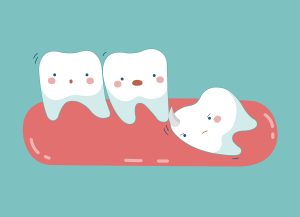For many people in their late teens and early twenties, the diagnosis from the family dentist informing them that they need their wisdom teeth removed is almost a rite of passage.
Yes, wisdom tooth removal is one of the most common dental procedures we perform!
Did you know that approximately 85% of wisdom teeth will eventually be removed at some stage?
But what do wisdom teeth actually do? And more importantly, why do they need to go?
Despite how common wisdom tooth removal is, not that many people have an understanding of why many dentists recommend getting them removed.
What are your wisdom teeth?
Your wisdom teeth (otherwise known as the third molar) are an extra set (4 teeth) of molars, the thick teeth in the back of your jaw used for chewing and grinding food. While some people never grow this extra set, the vast majority of us start seeing our wisdom teeth spout around age 20.
Our ancient ancestors needed this extra set of teeth. Their rough, unrefined foods and poorer dental hygiene meant that teeth were more prone to damage. Many of our ancestors had already lost some of their adult teeth early through ordinary use – this extra set certainly came in handy!
These days, most of us retain all our teeth for much longer.
And this is where the problems begin. There just isn’t enough real estate available to fit all these teeth!
But our wisdom teeth still need to grow somewhere. And by Jove, grow they will – in many cases rubbing up against other teeth (impacted wisdom teeth), causing jaw pain and overcrowding your mouth. In many cases, they also cause severe aches, necessitating their removal.
What if my wisdom teeth DON’T cause me any pain?
Contrary to popular belief, not all wisdom teeth surgeries are performed because the tooth is hurting. In fact, many dentists recommend getting your wisdom teeth removed regardless!
That’s because even if your wisdom teeth aren’t stopping you from enjoying your favourite foods, they can cause a number of other dental issues which are just as bad as tooth pain.
Cavities
Cavities thrive in the nooks and crannies of your jaw, where bacteria is free to eat away at your enamel without being cleaned off.
Since wisdom teeth erupt far back in your jaw and can grow at awkward angles, cleaning them properly can be a challenge. This is often an open invitation for tooth decay.
Gum pain
Another symptom that comes with wisdom teeth is gum pain.
Since space is tight in your jaw, wisdom teeth might only partially erupt. Or, they can develop fully, beneath your gums.
While this isn’t always painful, the flaps of gum on top of the wisdom tooth can become infected. We call this pericoronitis, which can spread to the throat or neck if untreated.
Dental Care Group is a dentist in Armadale that believes in preventative dentistry. And in some cases, that means nipping the problem in the bud and getting your wisdom teeth removed before they have the opportunity to cause you trouble later down the line!

Wisdom teeth removal: post-surgery recovery
As with any dental procedure, it’s important to take care of yourself after getting your wisdom teeth removed.
In the days immediately after wisdom teeth removal, you’ll probably see the usual post-surgery side effects: bleeding and swelling.
Bleeding
If you experience bleeding following your surgery, apply a cotton pad or gauze to the bleeding area and bite gently. Try to keep it in place for around 45 minutes.
If bleeding persists, give us a call anytime for immediate dental support. Call now: (03) 9509 1500.
Swelling
A common side-effect following dental surgery is tissue swelling.
To minimise swelling, apply a cold pack to your cheek, next to where your wisdom teeth were.
The cool ice can reduce the extent of swelling, so be diligent in applying cold packs immediately after surgery: we suggest applying ice on-and-off (on 30 minutes; off 30 minutes) on the day of surgery.
Beyond the first 24 hours, ice has little effect on controlling swelling, however it can still be used to relieve pain or stiffness.
The risk of infection after wisdom teeth surgery
Keeping your teeth and mouth clean is critical after wisdom teeth surgery.
This is because the gums around and under a freshly-removed tooth are particularly susceptible to infection from bacteria and food particles. Keep your routine up and avoid spicy food, soft drinks and anything that’s prone to getting stuck in gaps!
Tips to avoid infection after wisdom teeth extraction:
- Avoid rigorous rinsing (this may dislodge the blood clot that has begun to form)
- Ensure you rinse gently with salt and warm water
- Take medication at the prescribed intervals
- Restrict activities and rest well
- Use ice packs diligently
The best tip we can share is to contact Dental Care Group if you have ANY concerns or questions. Our phone is manned at all times, so no matter how trivial you think the matter may be, we’re ready to help you out! Call now (03) 9509 1500 with any questions.
Concerned about your wisdom teeth? Visit Dental Care Group\’s dentist in Armadale!
Your wisdom teeth can be the cause of unknown pain. Or, you might accidentally brush your tongue across some newly erupted teeth that you think may be your teeth coming through.
Regardless if you are or are not experiencing pain, regular dental check-ups are key to keeping an eye on growing, erupting, or impacted wisdom teeth. Even if you’re free from pain, your local dentist will be able to advise on whether your wisdom teeth ought to come out.
Need more information about wisdom teeth removal? Organise an obligation-free consultation with the friendly team, including principal dentist Dr Zelman Lew, at Dental Care Group. Book online here, or if you’d prefer, call us anytime on (03) 9509 1500!

